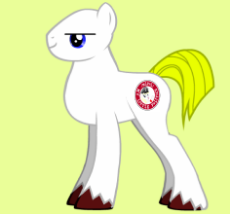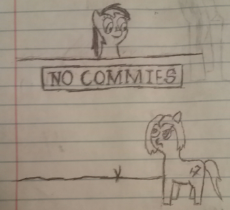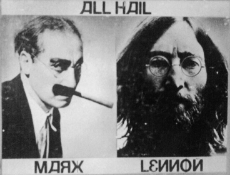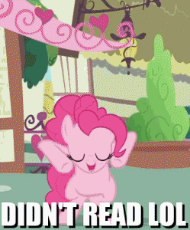This was a fun discussion
tl;dr:
>capitalism is voluntary exchange
>communism is suppose to be voluntary sharing
>the sharing is a form of exchange and doesn't violate the nap
>QED communism is capitalism
\r
/mlpol/ - My Little Politics
Archived thread
I love finding loopholes
Communism is forced sharing. Socialism + libertarian isn't communism.
This is basically mutualism, isn't it?
Communism is voluntary sharing until one guy decides there's something he isn't giving up freely, then it's either capitalism or gulags. I couldn't care less if commies formed their kibbutzes away from everyone else, but very few do that. They always end up trying to conquer all of society to their perverted way of thinking.
Communism is voluntary sharing until one guy decides there's something he isn't giving up freely, then it's either capitalism or gulags. I couldn't care less if commies formed their kibbutzes away from everyone else, but very few do that. They always end up trying to conquer all of society to their perverted way of thinking.
Capitalism is built within Marxist theory. I like to think of it like this, Marxism is capitalism turned on its head. Built on Ricardian foundations and focused on class relation, communism is utterly capitalistic to a regard, but not in the way that's normal. Barter is probably a good point since Marx bases his assumption of money as a commodity which derives value from labor. Of course, there has been no case for a barter based economy and value is not derived from labor, so Marx is wrong. Also, some other things that might connect libertarianism to communism is mutalism, voluntarianism, agorism, free market socialism (which the workers own the companies, but the economy is free market), anarchism, egoism, and the fact the word "libertarian" was actually a leftist term until being coopted.
Oh, and get the fuck off of Discord, Atlas.
Oh, and get the fuck off of Discord, Atlas.
>>126740
>Analogy
That's barter, not communism. A more accurate analogy would be the farmer giving up all his wheat to the community for nothing in return except continued access to daily bread. Blasted commies.
>Analogy
That's barter, not communism. A more accurate analogy would be the farmer giving up all his wheat to the community for nothing in return except continued access to daily bread. Blasted commies.
Within the co-operative society based on common ownership of the means of production, the producers
do not exchange their products; just as little does the labor employed on the products appear here as the
value of these products, as a material quality possessed by them, since now, in contrast to capitalist
society, individual labor no longer exists in an indirect fashion but directly as a component part of total
labor. The phrase "proceeds of labor", objectionable also today on account of its ambiguity, thus loses all
meaning.
do not exchange their products; just as little does the labor employed on the products appear here as the
value of these products, as a material quality possessed by them, since now, in contrast to capitalist
society, individual labor no longer exists in an indirect fashion but directly as a component part of total
labor. The phrase "proceeds of labor", objectionable also today on account of its ambiguity, thus loses all
meaning.
>>126798
As I understand it yes. You can nuke them for even bending a single strand of grass on your lawn.
>incidentally that is why I will kill all butterflies when I get my recreational nukes; no more bad weather
As I understand it yes. You can nuke them for even bending a single strand of grass on your lawn.
>incidentally that is why I will kill all butterflies when I get my recreational nukes; no more bad weather
>>126799
Please don’t, butterflies are friends and here they’re endangered, we used to get so many beautiful monarchs here in NorCal, now they bulldozes all the milkweed and we hardly ever see any butteflies any more.
Jews did this. They destroyed one of the most beautiful parts of nature I enjoyed.
Please don’t, butterflies are friends and here they’re endangered, we used to get so many beautiful monarchs here in NorCal, now they bulldozes all the milkweed and we hardly ever see any butteflies any more.
Jews did this. They destroyed one of the most beautiful parts of nature I enjoyed.
>>126821
Why did I see this and think of an alternate backstory of how Luna got to the moon in the first place?
Why did I see this and think of an alternate backstory of how Luna got to the moon in the first place?
>>126740
I can nip this whole thing real quick.
>Be communist
>Have nuclear power
>If everyone shares, does everyone have access to the nuclear power plant?
>If not, who would stop them? True communism is stateless and classless. To have a police force would, by virtue, create a state and a class.
>If the people DO have access to nuclear material, then everyone has access to the means of production.
If you pass that one:
>Be communist
>Have access to the means of production, i.e. energy
>How do you store/represent used energy?
>Trade wheat for bread
>How much work went into turning that wheat into bread? How do you quantify that?
>If you say money, then it isn't communism.
It's anarcho-something at that point, complete with McNukes and private factories that trade using a common unit of 'currency,' whatever it is.
I can nip this whole thing real quick.
>Be communist
>Have nuclear power
>If everyone shares, does everyone have access to the nuclear power plant?
>If not, who would stop them? True communism is stateless and classless. To have a police force would, by virtue, create a state and a class.
>If the people DO have access to nuclear material, then everyone has access to the means of production.
If you pass that one:
>Be communist
>Have access to the means of production, i.e. energy
>How do you store/represent used energy?
>Trade wheat for bread
>How much work went into turning that wheat into bread? How do you quantify that?
>If you say money, then it isn't communism.
It's anarcho-something at that point, complete with McNukes and private factories that trade using a common unit of 'currency,' whatever it is.
1520713035_1.jpg (123.5 KB, 1024x571, exclusive ownership must be established.jpg)

>>126740
Communism means abolition of private property, this sounds more like having a different method of owning private property. And I imagine even in this scenario people would at least be entitled to themselves.
Communism means abolition of private property, this sounds more like having a different method of owning private property. And I imagine even in this scenario people would at least be entitled to themselves.
>>127009
In that case, it's basically egoism. And, although Marxism calls to abolish private property, it makes the distinction personal and private property in which the latter is more succintly the means of production. Since the workers own their labour and time, they demand the full value of it and not have it expropiated by the bourgeois class who seek a surplus for profit. So what entails is specifically the abolition of this order, so that needs are met once industry has met its capacity to fulfill them. From then on, work is voluntary and so is being collective.
I'm not a Marxist by the way.
In that case, it's basically egoism. And, although Marxism calls to abolish private property, it makes the distinction personal and private property in which the latter is more succintly the means of production. Since the workers own their labour and time, they demand the full value of it and not have it expropiated by the bourgeois class who seek a surplus for profit. So what entails is specifically the abolition of this order, so that needs are met once industry has met its capacity to fulfill them. From then on, work is voluntary and so is being collective.
I'm not a Marxist by the way.
>>127009
To meet ancap rules all economic transactions require mutual consent, therefore if you have an egalitarian community where everyone shares everything voluntarily and nobody is being forced to give up their property it's not a violation of the NAP. However if people are being involuntarily forced into this arrangement, or are not allowed to take their rightful share of the community property and leave if they decide they don't want to be a part of the commune anymore, then it becomes a violation and aggression becomes justified. The problem with Communism is that it forces participation universally on everyone; it's a system that does not acknowledge the right of the individual to own property. Coercion and the use of force is what distinguishes a Communist system from a community where people voluntarily practice a communist lifestyle. although I say we should throw them all out of helicopters just in case.
To meet ancap rules all economic transactions require mutual consent, therefore if you have an egalitarian community where everyone shares everything voluntarily and nobody is being forced to give up their property it's not a violation of the NAP. However if people are being involuntarily forced into this arrangement, or are not allowed to take their rightful share of the community property and leave if they decide they don't want to be a part of the commune anymore, then it becomes a violation and aggression becomes justified. The problem with Communism is that it forces participation universally on everyone; it's a system that does not acknowledge the right of the individual to own property. Coercion and the use of force is what distinguishes a Communist system from a community where people voluntarily practice a communist lifestyle. although I say we should throw them all out of helicopters just in case.
>>127180
On the other hand, Marxist theory would actually disagree and retort that the exploitation of the capitalists prevents any mutuality in arrangements. The fact that you would throw them throw out of helicopters is particularly evident. A strain of feudal hierarchy carried over into the synthesis of capitalism is obvious there. Remember, in feudal societies there was the labouring poor and those on top who not only owned the means of production but also all the property. Only when that personal property was freed up to some of the commoners did a true evolution past feudalism occurred, however still those resided once as farmers were eventually coerced into working- this is documented- in early capitalist society. These kinks remained and many of the classical economists sought to correct them at times with such policies aimed at defying landlords (remnants of feudal society) whom sought gains by rent seeking (unearned increment of income.) Again, Marxism makes a distinction between personal property and private property, the latter which it rejects since it regards the means of production as public since the labour the labour is publically derived and the value of commodities is derived from labour. Coercion is actually derived from the bourgeoisie in material dialectic, and is backed many times by historical examples such as violent strike breaking even when voluntary collective bargaining is offered before hand. In Marxist defence, when all options are exhausted and class consciousness is gained, it is just for revolution to occur. The bourgeois would repress the proletariat anyways. The repression of the reformists is enough evidence since they seek change politically, yet are encountered with violence. Rightful share of community property is not an issue, each one is entitled to their full compensation. From each according to his ability, to each according to his needs. Meaning through industrious abundance, even those who do not work needs are met. This is justified since surplus is essential to the current capitalist build.
On the other hand, Marxist theory would actually disagree and retort that the exploitation of the capitalists prevents any mutuality in arrangements. The fact that you would throw them throw out of helicopters is particularly evident. A strain of feudal hierarchy carried over into the synthesis of capitalism is obvious there. Remember, in feudal societies there was the labouring poor and those on top who not only owned the means of production but also all the property. Only when that personal property was freed up to some of the commoners did a true evolution past feudalism occurred, however still those resided once as farmers were eventually coerced into working- this is documented- in early capitalist society. These kinks remained and many of the classical economists sought to correct them at times with such policies aimed at defying landlords (remnants of feudal society) whom sought gains by rent seeking (unearned increment of income.) Again, Marxism makes a distinction between personal property and private property, the latter which it rejects since it regards the means of production as public since the labour the labour is publically derived and the value of commodities is derived from labour. Coercion is actually derived from the bourgeoisie in material dialectic, and is backed many times by historical examples such as violent strike breaking even when voluntary collective bargaining is offered before hand. In Marxist defence, when all options are exhausted and class consciousness is gained, it is just for revolution to occur. The bourgeois would repress the proletariat anyways. The repression of the reformists is enough evidence since they seek change politically, yet are encountered with violence. Rightful share of community property is not an issue, each one is entitled to their full compensation. From each according to his ability, to each according to his needs. Meaning through industrious abundance, even those who do not work needs are met. This is justified since surplus is essential to the current capitalist build.
>>127189
This argument basically proves why Marxists need to be thrown from helicopters. The issue here is that a Marxist argues from a completely different definition of natural rights than any other person would. Marxism fundamentally rejects the concept of property, that's why it is incompatible with civil society. The pseudo-distinction they make between "private" property and "personal" property doesn't matter because there really is no such distinction, property is property. Property is not just land and resources and things you own, property is also your body, your life, your work. You yourself are your own property. You have natural ownership of yourself and by extension everything you produce and/or acquire through your own effort that does not already belong to someone else. That is what every individual has a right to, and it is the only thing an individual has a right to. No person is automatically entitled to any property belonging to another person, only the property they own and the property they can acquire. No person automatically owes service or loyalty to another person, although they can voluntarily offer it, and no person has the right to demand service or loyalty from another person. You mention feudalism; this is basically the classical liberal argument against it.
Things that are not naturally owned by anyone, such as land, raw materials, etc, are up for grabs until someone claims them. Once something is claimed it becomes property. If I pick up a random stick off the ground, it becomes my stick. If you take it away from me by force, you've stolen my stick. The stick does not by its essence belong to either of us, it only belongs to me because I claimed it first. If I discard it, it's no longer my stick and you can pick it up if you want it, then it becomes your stick. If I decide I want it back and take it from you by force, I've now stolen your stick.
The NAP is a concept that tries to create an orderly system for mutually beneficial property transference. It basically builds on this concept of natural property rights and states that in order for property to change hands, both parties must agree to the transaction. Any individual who attempts to take the property of another individual without that individual's consent has committed an act of aggression and has violated the NAP. The victim of the aggression, through his natural right of ownership, now has the right to respond with whatever force he deems necessary in order to preserve his property. It doesn't matter if the property in question is a piece of land, a toothbrush, a ham sandwich, or your life; if someone tries to take your property by force, you have a right to do whatever you deem necessary to protect it. That's where you get the ancap memes about people firing tomahawk missiles at each other for stealing each other's newspapers and things like that. In actual practice of course people are generally more reasonable and prefer to avoid those sorts of extreme solutions, and it's usually in a community's interest to have some sort of mutually agreed upon system for resolving such disputes like a court, but technically you could argue that you have a natural right to kill someone for stealing your newspaper and you would be 100% right. Probably wouldn't hold up in court, but at least you would feel vindicated while serving out your prison term.
This argument basically proves why Marxists need to be thrown from helicopters. The issue here is that a Marxist argues from a completely different definition of natural rights than any other person would. Marxism fundamentally rejects the concept of property, that's why it is incompatible with civil society. The pseudo-distinction they make between "private" property and "personal" property doesn't matter because there really is no such distinction, property is property. Property is not just land and resources and things you own, property is also your body, your life, your work. You yourself are your own property. You have natural ownership of yourself and by extension everything you produce and/or acquire through your own effort that does not already belong to someone else. That is what every individual has a right to, and it is the only thing an individual has a right to. No person is automatically entitled to any property belonging to another person, only the property they own and the property they can acquire. No person automatically owes service or loyalty to another person, although they can voluntarily offer it, and no person has the right to demand service or loyalty from another person. You mention feudalism; this is basically the classical liberal argument against it.
Things that are not naturally owned by anyone, such as land, raw materials, etc, are up for grabs until someone claims them. Once something is claimed it becomes property. If I pick up a random stick off the ground, it becomes my stick. If you take it away from me by force, you've stolen my stick. The stick does not by its essence belong to either of us, it only belongs to me because I claimed it first. If I discard it, it's no longer my stick and you can pick it up if you want it, then it becomes your stick. If I decide I want it back and take it from you by force, I've now stolen your stick.
The NAP is a concept that tries to create an orderly system for mutually beneficial property transference. It basically builds on this concept of natural property rights and states that in order for property to change hands, both parties must agree to the transaction. Any individual who attempts to take the property of another individual without that individual's consent has committed an act of aggression and has violated the NAP. The victim of the aggression, through his natural right of ownership, now has the right to respond with whatever force he deems necessary in order to preserve his property. It doesn't matter if the property in question is a piece of land, a toothbrush, a ham sandwich, or your life; if someone tries to take your property by force, you have a right to do whatever you deem necessary to protect it. That's where you get the ancap memes about people firing tomahawk missiles at each other for stealing each other's newspapers and things like that. In actual practice of course people are generally more reasonable and prefer to avoid those sorts of extreme solutions, and it's usually in a community's interest to have some sort of mutually agreed upon system for resolving such disputes like a court, but technically you could argue that you have a natural right to kill someone for stealing your newspaper and you would be 100% right. Probably wouldn't hold up in court, but at least you would feel vindicated while serving out your prison term.
>>127284
contd.
The problem with Marxism is that it fundamentally rejects the concept of natural property ownership and imposes its own concept of natural law. In Marxist thinking, everything naturally belongs to everyone and there is no property. Think about that in the context of how I explained property earlier, that you yourself are your own property. To a Marxist, all people fundamentally belong to each other and nobody belongs to himself. There is no concept of the individual in Marxism; only the collective exists. If we go back to the example of the stick, under Marxist thinking I can pick up the stick only if I need it and can only possess it for as long as nobody else needs it. If I pick up the stick because I need it to knock a piece of fruit off of a tree so I can eat, but someone who is hungrier than me also needs the same stick for the same reason, I would be obligated to give it to him. In fact, if someone hungrier than me needed that fruit but was too feeble to pick up the stick and knock the fruit off of the tree, I would be obligated to pick up the stick, knock the fruit off the tree, give him the fruit, put the stick back where I found it, and go find something else to eat. The reason: I do not own the stick, the fruit, or even my own hunger. My hunger is a need and I am allowed to satisfy it, but after everyone with greater need has had their need met. The fact that I found the stick, I saw the fruit, I had the idea to knock it off the tree, I had the ability to use the stick for that purpose, none of that matters. All that matters to a Marxist is who needs the fruit most.
Communism can't exist alongside anything that isn't Communism. As you stated, a Communist society that uses force to take property away from individuals and distribute them among the collective would not be seen as coercive, it would be seen as just, because the individual was hoarding something that belonged to the collective. No one can even voluntarily submit to Communism, because Communism is seen as the rightful order, and nobody has a right to their own will. Every individual is duty-bound to serve the collective and has no right to pursue self interest because he does not rightfully possess a self.
Marxism, Communism, collectivism, and all other analogs of this concept are by their very nature a violation of the NAP. Simply by advocating this philosophy it's adherents are attempting to seize the individual rights of all non-adherents and merge them into their collective. Physical removal is literally the only reasonable solution.
contd.
The problem with Marxism is that it fundamentally rejects the concept of natural property ownership and imposes its own concept of natural law. In Marxist thinking, everything naturally belongs to everyone and there is no property. Think about that in the context of how I explained property earlier, that you yourself are your own property. To a Marxist, all people fundamentally belong to each other and nobody belongs to himself. There is no concept of the individual in Marxism; only the collective exists. If we go back to the example of the stick, under Marxist thinking I can pick up the stick only if I need it and can only possess it for as long as nobody else needs it. If I pick up the stick because I need it to knock a piece of fruit off of a tree so I can eat, but someone who is hungrier than me also needs the same stick for the same reason, I would be obligated to give it to him. In fact, if someone hungrier than me needed that fruit but was too feeble to pick up the stick and knock the fruit off of the tree, I would be obligated to pick up the stick, knock the fruit off the tree, give him the fruit, put the stick back where I found it, and go find something else to eat. The reason: I do not own the stick, the fruit, or even my own hunger. My hunger is a need and I am allowed to satisfy it, but after everyone with greater need has had their need met. The fact that I found the stick, I saw the fruit, I had the idea to knock it off the tree, I had the ability to use the stick for that purpose, none of that matters. All that matters to a Marxist is who needs the fruit most.
Communism can't exist alongside anything that isn't Communism. As you stated, a Communist society that uses force to take property away from individuals and distribute them among the collective would not be seen as coercive, it would be seen as just, because the individual was hoarding something that belonged to the collective. No one can even voluntarily submit to Communism, because Communism is seen as the rightful order, and nobody has a right to their own will. Every individual is duty-bound to serve the collective and has no right to pursue self interest because he does not rightfully possess a self.
Marxism, Communism, collectivism, and all other analogs of this concept are by their very nature a violation of the NAP. Simply by advocating this philosophy it's adherents are attempting to seize the individual rights of all non-adherents and merge them into their collective. Physical removal is literally the only reasonable solution.
>>127284
>In Marxist thinking, everything naturally belongs to everyone and there is no property.
Nice bait and switch. You obfuscate the meaning of property rights several times. The concept of property ownership itself being murky. First of which is this, "
Things that are not naturally owned by anyone, such as land, raw materials, etc, are up for grabs until someone claims them." Well, that is wrong. The claim to land is predicated on one's improvement of the land. If a labourer builds upon land, forms the area around it, and personifies it; is he too not an owner? The other distinction as governed by law. Now this is a Roman designation, however you clearly reject law, so it does not matter. I suppose common law may apply, but that's far too collectivistic. No, what you define law as a contract. To which doesn't suit much for property rights. Multiple parties can claim a single area with no feasible proof of being the first to occupy, or feasibly multiple people can be the first. This is why there are property disputes, and why there's a massive system of judicial body to justify the "right" to property.
Proudhon:
The right of occupation, or of the first occupant, is that which results from the actual, physical, real possession of a thing. I occupy a piece of land; the presumption is, that I am the proprietor, until the contrary is proved. We know that originally such a right cannot be legitimate unless it is reciprocal; the jurists say as much.
Cicero compares the earth to a vast theatre: Quemadmodum theatrum cum commune sit, recte tamen dici potest ejus esse eum locum quem quisque occuparit.
This passage is all that ancient philosophy has to say about the origin of property.
The theatre, says Cicero, is common to all; nevertheless, the place that each one occupies is called his own; that is, it is a place possessed, not a place appropriated. This comparison annihilates property; moreover, it implies equality. Can I, in a theatre, occupy at the same time one place in the pit, another in the boxes, and a third in the gallery? Not unless I have three bodies, like Geryon, or can exist in different places at the same time, as is related of the magician Apollonius.
According to Cicero, no one has a right to more than he needs: such is the true interpretation of his famous axiom — suum quidque cujusque sit, to each one that which belongs to him — an axiom that has been strangely applied. That which belongs to each is not that which each may possess, but that which each has a right to possess. Now, what have we a right to possess? That which is required for our labour and consumption; Cicero’s comparison of the earth to a theatre proves it. According to that, each one may take what place he will, may beautify and adorn it, if he can; it is allowable: but he must never allow himself to overstep the limit which separates him from another. The doctrine of Cicero leads directly to equality; for, occupation being pure toleration, if the toleration is mutual (and it cannot be otherwise) the possessions are equal.
You see, the posts I made before on property had implied no coercion, but clearly defined from your definition of property attainment, coercion is fundamental to maintain a monopoly on appropriated land, if not then the whole thing falls apart and property reverts to single occupancy. But, it's your definition, and not Marxist. It's definitely not individualist neither, since the divide here is not by property, but individuality. Your explanation commodifies the individual as property and upholds instead a social contract.
“the individual has an existence only as a producer of exchange value, hence that the whole negation of his natural existence is already implied; that he is therefore entirely determined by society; that this further presupposes a division of labour etc., in which the individual is already posited in relations other than that of mere exchanger, etc. That therefore this presupposition by no means arises either out of the individual’s will or out of the immediate nature of the individual, but that it is, rather, historical, and posits the individual as already determined by society.”
Anon, by default, you believe that the right to property entails the right to aggression and coercion. And although you may have stated property is only obtained by transaction I think, history shows different. That through violence, property cam be obtained, and has often been obtained this way. Lenin has before said that highest form of capitalism, so it can be assumed that property appropriation is the most basic form. Tell me, if this appropriated land is transacted mutually, does this essentially "clean" the coopted property and is now owned by someone new, or is it still rightfully that of the first occupant? Is not right to seize this original property then if so? These are blind spots in judgement of the NAP dogma. You're right that "the NAP is a concept that tries to create an orderly system," but only that it tries, but fails. The memes are probably the logical conclusion in practice. You also mentioned a court. Shouldn't that not exist under Ancapistan? Or, is it a private court? What if someone doesn't agree with the settlement? Is he allowed to be killed? How? Doesn't he own the right to the property of his life? In this case, any fight or reaction on either side is justified because apparently your life is property too! Can't have someone coerce your life.
But, it's not about life. Because life is not property. What can be assumed that as long as someone occupies a land, that is property.
>In Marxist thinking, everything naturally belongs to everyone and there is no property.
Nice bait and switch. You obfuscate the meaning of property rights several times. The concept of property ownership itself being murky. First of which is this, "
Things that are not naturally owned by anyone, such as land, raw materials, etc, are up for grabs until someone claims them." Well, that is wrong. The claim to land is predicated on one's improvement of the land. If a labourer builds upon land, forms the area around it, and personifies it; is he too not an owner? The other distinction as governed by law. Now this is a Roman designation, however you clearly reject law, so it does not matter. I suppose common law may apply, but that's far too collectivistic. No, what you define law as a contract. To which doesn't suit much for property rights. Multiple parties can claim a single area with no feasible proof of being the first to occupy, or feasibly multiple people can be the first. This is why there are property disputes, and why there's a massive system of judicial body to justify the "right" to property.
Proudhon:
The right of occupation, or of the first occupant, is that which results from the actual, physical, real possession of a thing. I occupy a piece of land; the presumption is, that I am the proprietor, until the contrary is proved. We know that originally such a right cannot be legitimate unless it is reciprocal; the jurists say as much.
Cicero compares the earth to a vast theatre: Quemadmodum theatrum cum commune sit, recte tamen dici potest ejus esse eum locum quem quisque occuparit.
This passage is all that ancient philosophy has to say about the origin of property.
The theatre, says Cicero, is common to all; nevertheless, the place that each one occupies is called his own; that is, it is a place possessed, not a place appropriated. This comparison annihilates property; moreover, it implies equality. Can I, in a theatre, occupy at the same time one place in the pit, another in the boxes, and a third in the gallery? Not unless I have three bodies, like Geryon, or can exist in different places at the same time, as is related of the magician Apollonius.
According to Cicero, no one has a right to more than he needs: such is the true interpretation of his famous axiom — suum quidque cujusque sit, to each one that which belongs to him — an axiom that has been strangely applied. That which belongs to each is not that which each may possess, but that which each has a right to possess. Now, what have we a right to possess? That which is required for our labour and consumption; Cicero’s comparison of the earth to a theatre proves it. According to that, each one may take what place he will, may beautify and adorn it, if he can; it is allowable: but he must never allow himself to overstep the limit which separates him from another. The doctrine of Cicero leads directly to equality; for, occupation being pure toleration, if the toleration is mutual (and it cannot be otherwise) the possessions are equal.
You see, the posts I made before on property had implied no coercion, but clearly defined from your definition of property attainment, coercion is fundamental to maintain a monopoly on appropriated land, if not then the whole thing falls apart and property reverts to single occupancy. But, it's your definition, and not Marxist. It's definitely not individualist neither, since the divide here is not by property, but individuality. Your explanation commodifies the individual as property and upholds instead a social contract.
“the individual has an existence only as a producer of exchange value, hence that the whole negation of his natural existence is already implied; that he is therefore entirely determined by society; that this further presupposes a division of labour etc., in which the individual is already posited in relations other than that of mere exchanger, etc. That therefore this presupposition by no means arises either out of the individual’s will or out of the immediate nature of the individual, but that it is, rather, historical, and posits the individual as already determined by society.”
Anon, by default, you believe that the right to property entails the right to aggression and coercion. And although you may have stated property is only obtained by transaction I think, history shows different. That through violence, property cam be obtained, and has often been obtained this way. Lenin has before said that highest form of capitalism, so it can be assumed that property appropriation is the most basic form. Tell me, if this appropriated land is transacted mutually, does this essentially "clean" the coopted property and is now owned by someone new, or is it still rightfully that of the first occupant? Is not right to seize this original property then if so? These are blind spots in judgement of the NAP dogma. You're right that "the NAP is a concept that tries to create an orderly system," but only that it tries, but fails. The memes are probably the logical conclusion in practice. You also mentioned a court. Shouldn't that not exist under Ancapistan? Or, is it a private court? What if someone doesn't agree with the settlement? Is he allowed to be killed? How? Doesn't he own the right to the property of his life? In this case, any fight or reaction on either side is justified because apparently your life is property too! Can't have someone coerce your life.
But, it's not about life. Because life is not property. What can be assumed that as long as someone occupies a land, that is property.
>>127292
It's fundamentally different when it comes to land, thus there is this distinction between private and personal. Your stick analogy is dumb. And, you mischaracterise Marxist character. Unlike your character which can be properly characterised as coercive.
"Marxism, Communism, collectivism, and all other analogs of this concept are by their very nature a violation of the NAP. Simply by advocating this philosophy it's adherents are attempting to seize the individual rights of all non-adherents and merge them into their collective. Physical removal is literally the only reasonable solution."
Literally advocating expulsion because of an opinion. Which is free speech, right?
It's fundamentally different when it comes to land, thus there is this distinction between private and personal. Your stick analogy is dumb. And, you mischaracterise Marxist character. Unlike your character which can be properly characterised as coercive.
"Marxism, Communism, collectivism, and all other analogs of this concept are by their very nature a violation of the NAP. Simply by advocating this philosophy it's adherents are attempting to seize the individual rights of all non-adherents and merge them into their collective. Physical removal is literally the only reasonable solution."
Literally advocating expulsion because of an opinion. Which is free speech, right?
>>127292
>>127293
I've probably been misusing the term "Marxism" a bit, I mostly use it as a generic blanket term to refer to people who believe in a system where property is forcibly seized and redistributed. I've never actually read anything by Marx and don't really care to. It sounds like you know more than I do about the nitpicky bullshit he argued and that's fine, as I said I'm not really interested. However, you seem to have missed my main point, which is that A) individuals exist as autonomous entities that have a natural right to pursue their own self interest, which includes owning property, and B) that Marxism (or socialism, or Communism, collectivism, Bolshevism, or whatever specific variant of the concept you want to use) is incompatible with that.
Also, I don't think I mischaracterised Marxists at all; literally their entire belief system is based on coercion. If you don't see it that way then it basically proves what I said, that you fundamentally don't believe in the concept of ownership and see the forcible seizure of others' property as some warped kind of restoration of natural order. By contrast, my character is not coercive at all, I'm quite passive actually. I just want to live in my house, watch my ponies and anime, run my businesses, and collect my income. I literally could give a fuck less what anyone else has or doesn't have. I don't generally like to get violent and don't make a habit of using physical force against people if I don't have to. However, if you come onto my property and attempt to take it from me, or even worse, try to say that it was never mine in the first place and that a bunch of complete strangers are entitled to a share of it by sheer virtue of their existing on the same Earth as me, I'd honestly just as soon shoot you or toss you out of a helicopter as stand around arguing with you about it.
>>127293
I've probably been misusing the term "Marxism" a bit, I mostly use it as a generic blanket term to refer to people who believe in a system where property is forcibly seized and redistributed. I've never actually read anything by Marx and don't really care to. It sounds like you know more than I do about the nitpicky bullshit he argued and that's fine, as I said I'm not really interested. However, you seem to have missed my main point, which is that A) individuals exist as autonomous entities that have a natural right to pursue their own self interest, which includes owning property, and B) that Marxism (or socialism, or Communism, collectivism, Bolshevism, or whatever specific variant of the concept you want to use) is incompatible with that.
Also, I don't think I mischaracterised Marxists at all; literally their entire belief system is based on coercion. If you don't see it that way then it basically proves what I said, that you fundamentally don't believe in the concept of ownership and see the forcible seizure of others' property as some warped kind of restoration of natural order. By contrast, my character is not coercive at all, I'm quite passive actually. I just want to live in my house, watch my ponies and anime, run my businesses, and collect my income. I literally could give a fuck less what anyone else has or doesn't have. I don't generally like to get violent and don't make a habit of using physical force against people if I don't have to. However, if you come onto my property and attempt to take it from me, or even worse, try to say that it was never mine in the first place and that a bunch of complete strangers are entitled to a share of it by sheer virtue of their existing on the same Earth as me, I'd honestly just as soon shoot you or toss you out of a helicopter as stand around arguing with you about it.
47 replies | 12 files | 20 UUIDs | Archived











 Ex: Type :littlepip: to add Littlepip
Ex: Type :littlepip: to add Littlepip  Ex: Type :eqg-rarity: to add EqG Rarity
Ex: Type :eqg-rarity: to add EqG Rarity 